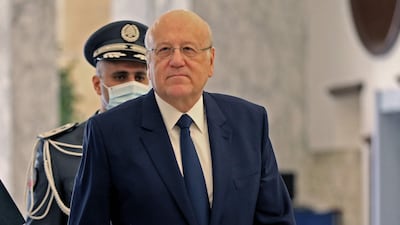Lebanon's people will have to make sacrifices, Prime Minister Najib Mikati said on Monday, as the country's new government met for the first time.
Mr Mikati recently formed an administration, ending 13 months of caretaker government during which political leaders fought over ministerial posts as the economy collapsed.
“The country requires exceptional measures,” Mr Mikati said from the presidential palace in Baabda, a Beirut suburb.
“We all have to sacrifice.”
The Cabinet must now decide on a plan to save the country from a severe economic crisis and enact reforms crucial to unlock billions of dollars in loans and debt relief.
Mr Mikati, a telecoms billionaire, said his government would “deal with the issue of fuel and medicine to stop the humiliation of people".
Lebanon has been suffering from severe shortages of imported goods such as petrol and medicine, which are subsidised by the government. The central bank's foreign-currency reserves have dwindled since an economic crisis hit in late 2019, severely restricting the imports of subsidised products.
People have had to queue for hours at petrol stations to fill their tanks, with many calling them “lines of humiliation".
The shortage of fuel has also affected the supply of electricity, both from state-owned power plants that run on fuel oil and diesel-powered private generators that make up the shortfall in the state supply. Extended power cuts have affected the functioning of hospitals, as well as businesses such as food suppliers.
Political parties that have been widely blamed for the present crisis chose most of the 24 new ministers.
Mr Mikati said the government would restart negotiations with the International Monetary Fund this week. Securing international funding is critical to addressing an economic crisis that, according to the UN, has pushed nearly 80 per cent of the population below the poverty line.
The Cabinet is also expected to lift subsidies, which Mr Mikati has said the country can no longer afford. Ministers must also prepare for parliamentary elections in eight months' time.
President Michel Aoun, an ally of the Iran-backed Hezbollah movement that holds sway over Lebanese politics, led the Cabinet meeting.
Mr Aoun said he hoped the new government would restart negotiations with the IMF. Talks on an assistance package broke down last year after disagreements between the government, Parliament and the central bank.
At the end of the Cabinet meeting, the ministers formed a committee that will draft an outline of the government's policies.
They must submit the plan to Parliament, which needs to approve it for the government to be sworn in.
The government has one month to submit its plan, a presidential spokesman said.
“The first meeting took place today but they will need to meet many more times to get the plan done,” he said.
This step is seen as a formality because Lebanon's major political players, including Parliament Speaker Nabih Berri, picked the new ministers.


























